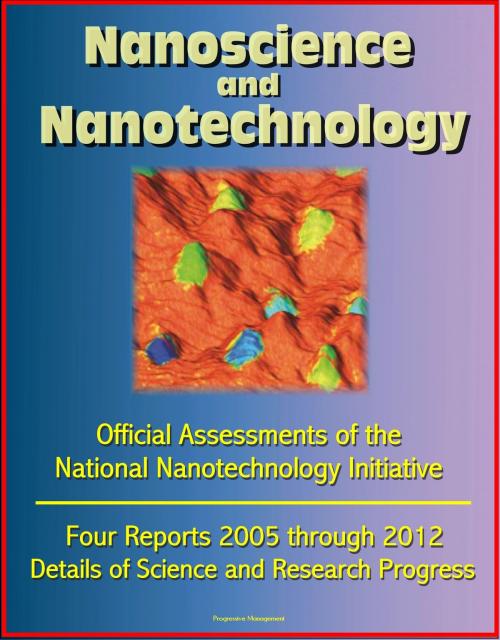Nanoscience and Nanotechnology: Official Assessments of the National Nanotechnology Initiative, Four Reports 2005 through 2012 - Details of Science and Research Progress
Nonfiction, Science & Nature, Technology, Nanotechnology| Author: | Progressive Management | ISBN: | 9781301318353 |
| Publisher: | Progressive Management | Publication: | May 29, 2013 |
| Imprint: | Smashwords Edition | Language: | English |
| Author: | Progressive Management |
| ISBN: | 9781301318353 |
| Publisher: | Progressive Management |
| Publication: | May 29, 2013 |
| Imprint: | Smashwords Edition |
| Language: | English |
This compilation of four important reports by the President's Council of Advisors on Science and Technology (PCAST) provides a complete, detailed overview of the progress made by the National Nanotechnology Initiative. The National Nanotechnology Initiative (NNI) is a crosscutting Federal program designed to coordinate U.S. investment in research and development (R&D) activities in nanoscale science, engineering, technology, and related efforts across 26 agencies and programs.
Contents: The National Nanotechnology Initiative at Five Years: Assessment and Recommendations of the National Nanotechnology Advisory Panel 2005 * The National Nanotechnology Initiative: Second Assessment and Recommendations of the National Nanotechnology Advisory Panel 2008 * Report to the President and Congress on the Third Assessment of the National Nanotechnology Initiative 2010 * Report to the President and Congress on the Fourth Assessment of the National Nanotechnology Initiative 2012
In 2001 the Federal Government launched the National Nanotechnology Initiative (NNI) with an initial budget of $500 million. The NNI is a crosscutting Federal program designed to coordinate U.S. investment in research and development (R&D) activities in nanoscale science, engineering, technology, and related efforts across 26 agencies and programs, 15 of which have budgets dedicated to nanotechnology research and development. The NNI has four broad objectives: (1) to advance world-class nanotechnology research and development; (2) to foster the transfer of new technologies into products for commercial and public benefit; (3) to develop and sustain educational resources, a skilled workforce, and the supporting infrastructure and tools to advance nanotechnology; and (4) to support the responsible development of nanotechnology. Many of these goals may take decades to develop. As President Clinton explained in his January 21, 2000, speech at the California Institute of Technology, "Some of our research goals will take twenty or more years to achieve. But that is why, precisely why.. .there is such a critical role for the Federal Government."
Nanotechnology is the control and restructuring of matter at the nanoscale, in the size range of approximately 1-100 nanometers, in order to create materials, devices, and systems with fundamentally new properties and functions due to their small structure. Encompassing nanoscale science, engineering, and technology, nanotechnology involves imaging, measuring, modeling, and manipulating matter at this length scale. A nanometer is one-billionth of a meter. One sheet of paper is about 100,000 nanometers thick; a single gold atom is about a third of a nanometer in diameter.
This compilation of four important reports by the President's Council of Advisors on Science and Technology (PCAST) provides a complete, detailed overview of the progress made by the National Nanotechnology Initiative. The National Nanotechnology Initiative (NNI) is a crosscutting Federal program designed to coordinate U.S. investment in research and development (R&D) activities in nanoscale science, engineering, technology, and related efforts across 26 agencies and programs.
Contents: The National Nanotechnology Initiative at Five Years: Assessment and Recommendations of the National Nanotechnology Advisory Panel 2005 * The National Nanotechnology Initiative: Second Assessment and Recommendations of the National Nanotechnology Advisory Panel 2008 * Report to the President and Congress on the Third Assessment of the National Nanotechnology Initiative 2010 * Report to the President and Congress on the Fourth Assessment of the National Nanotechnology Initiative 2012
In 2001 the Federal Government launched the National Nanotechnology Initiative (NNI) with an initial budget of $500 million. The NNI is a crosscutting Federal program designed to coordinate U.S. investment in research and development (R&D) activities in nanoscale science, engineering, technology, and related efforts across 26 agencies and programs, 15 of which have budgets dedicated to nanotechnology research and development. The NNI has four broad objectives: (1) to advance world-class nanotechnology research and development; (2) to foster the transfer of new technologies into products for commercial and public benefit; (3) to develop and sustain educational resources, a skilled workforce, and the supporting infrastructure and tools to advance nanotechnology; and (4) to support the responsible development of nanotechnology. Many of these goals may take decades to develop. As President Clinton explained in his January 21, 2000, speech at the California Institute of Technology, "Some of our research goals will take twenty or more years to achieve. But that is why, precisely why.. .there is such a critical role for the Federal Government."
Nanotechnology is the control and restructuring of matter at the nanoscale, in the size range of approximately 1-100 nanometers, in order to create materials, devices, and systems with fundamentally new properties and functions due to their small structure. Encompassing nanoscale science, engineering, and technology, nanotechnology involves imaging, measuring, modeling, and manipulating matter at this length scale. A nanometer is one-billionth of a meter. One sheet of paper is about 100,000 nanometers thick; a single gold atom is about a third of a nanometer in diameter.















